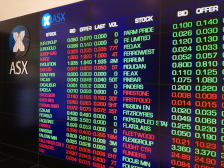Strong economic data stablises markets
Growing consumer confidence and easing political tensions have seen a rebound in markets, according to AMP Capital chief economist Shane Oliver.
While there are still some “near-term uncertainties” Mr Oliver says the outlook for markets appears positive.
“We anticipate shares trending higher over the next 12 months helped by okay valuations, very easy global monetary conditions and continuing moderate global economic growth,” he said.
Strong economic performances coming out of international markets are also a promising sign.
“US economic data was good with a slight rise in small business optimism and continued strong data on job openings (albeit down slightly) and hiring and ultra-low jobless claims.”
“After a long period of deceleration, Chinese growth looks to be stabilising just above 6.5 per cent, which is good for commodity prices and hence Australia,” Mr Oliver added.
Likewise, the consequences of several international events are becoming better known, permeating a greater sense of security for investors.
The news of Theresa May stepping in as Britain’s new prime minister seems to have consolidated confidence, with European and Japanese shares recovering much of or all their losses following Brexit.
Despite fears it might encourage growing dissatisfaction in Europe, underwhelming results for populist party Podemos in the Spanish election signal Brexit may instead serve as a deterrent.
“The key is that if Brexit is demonstrated to be more trouble than remaining in the EU then the risk of a domino effect of exits across the eurozone will be much reduced,” Mr Oliver said.
While China’s disregard for the UN court ruling in favour of the Philippines over disputed islands in the South China Sea might see Beijing try to establish an air defence identification zone (ADIZ) in the region, Mr Oliver says this does not necessarily mean conflict.
“An ADIZ was declared by China over disputed islands with Japan in 2013 and not enforced. China’s foreign minister indicated a willingness to peacefully resolve the dispute through negotiations which the new, more pro-China president of the Philippines may be amenable to,” he said.
“[There are] lots of risks in the South China Sea but this could drag on for years and come to nothing despite occasional flare ups.”








